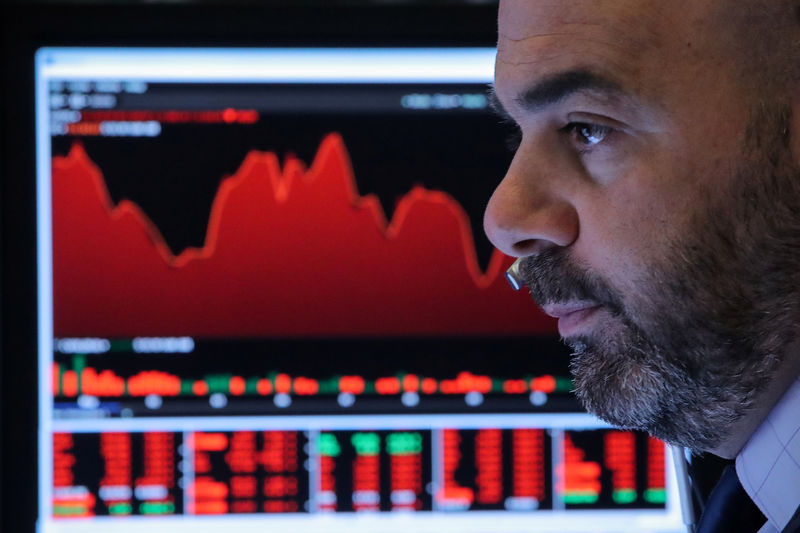By Stephen Culp
NEW YORK (Reuters) - Wall Street sank on Monday after China defied Washington by announcing retaliatory tariffs, the latest salvo in the two countries' increasingly belligerent trade war, sending investors fleeing equities for less risky assets.
All three major U.S. indexes lost ground in a widespread sell-off, with the tech-heavy Nasdaq posting its biggest one-day percentage loss this year. The S&P 500 and the Dow both had their largest percentage drop since Jan 3.
China said it would impose higher tariffs on $60 billion in U.S. goods despite President Donald Trump's warnings not to retaliate against additional tariffs on Chinese imports announced by the White House on Friday. The move stoked fears of a global economic downturn.
"The market's realizing that this was an absolute breakdown of (trade) talks and everything is gone backwards," said Michael O'Rourke, chief market strategist at JonesTrading in Greenwich, Connecticut.
"It could be very bad," O'Rourke added. "There's a lot of uncertainty. This should lead to further slowing in the economy."
Investors responded by fleeing equities for safe-haven assets.
U.S. Treasury yields fell to six-week lows, with 10-year yields falling below those of 3-month bills, an inversion seen by many as a potential harbinger of recession.
Gold prices rose to a near three-month high.
The CBOE Volatility index (VIX), a gauge of investor anxiety, posted its biggest daily point gain so far this year.
The Dow Jones Industrial Average (DJI) fell 617.38 points, or 2.38%, to 25,324.99, the S&P 500 (SPX) lost 69.53 points, or 2.41%, to 2,811.87 and the Nasdaq Composite (IXIC) dropped 269.92 points, or 3.41%, to 7,647.02.
Of the 11 major sectors of the S&P 500, only utilities (SPLRCU) ended the session in the black. Trade-sensitive tech companies (SPLRCT) suffered the largest percentage decline.
Among stocks particularly vulnerable to U.S.-China tariffs, Boeing Co (N:BA) slid 4.9% and Caterpillar Inc (N:CAT) fell 4.6% while the Philadelphia Chip index (SOX) was down 4.7%, posting its biggest percentage drop since Jan. 3 and extending last week's 6% decline.
Shares of Apple Inc (O:AAPL) sank 5.8% on the double whammy of heightened trade tensions and a decision by the U.S. Supreme Court to allow an antitrust lawsuit accusing the company of monopolizing the iPhone app market.
Uber Technologies Inc (N:UBER) extended its slide, falling 10.8% on its second day as a publicly traded company following Friday's underwhelming debut.
Ride-hailing peer Lyft Inc (O:LYFT) was also down, dropping 5.8%.
Shares of Tesla Inc (O:TSLA) fell 5.2% to their lowest in more than two years.
First quarter reporting season is in the home stretch, and of the 451 companies in the S&P 500 that have posted results, 75.2% have come in above expectations.
Analysts now see an S&P 500 earnings increase of 1.3% for the January-March period, significantly better than the 2% decrease expected on April 1.
Declining issues outnumbered advancing ones on the NYSE by a 4.81-to-1 ratio; on Nasdaq, a 5.12-to-1 ratio favored decliners.
The S&P 500 posted 12 new 52-week highs and 22 new lows; the Nasdaq Composite recorded 30 new highs and 151 new lows.

Volume on U.S. exchanges was 8.24 billion shares, compared to the 6.97 billion-share average over the last 20 trading days.